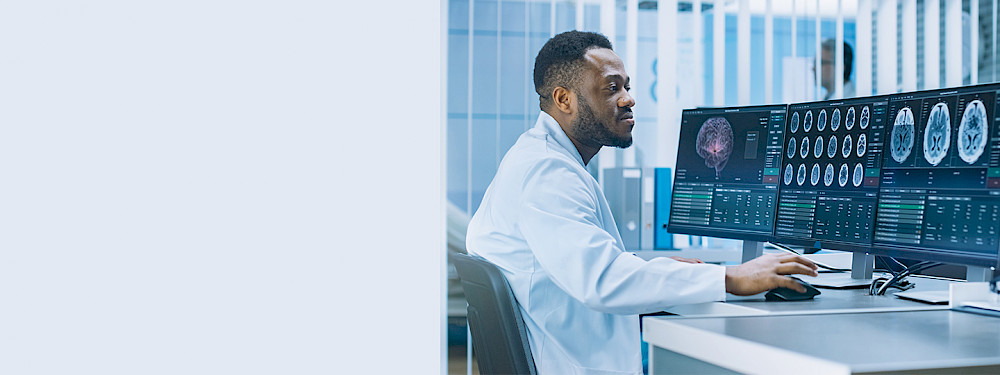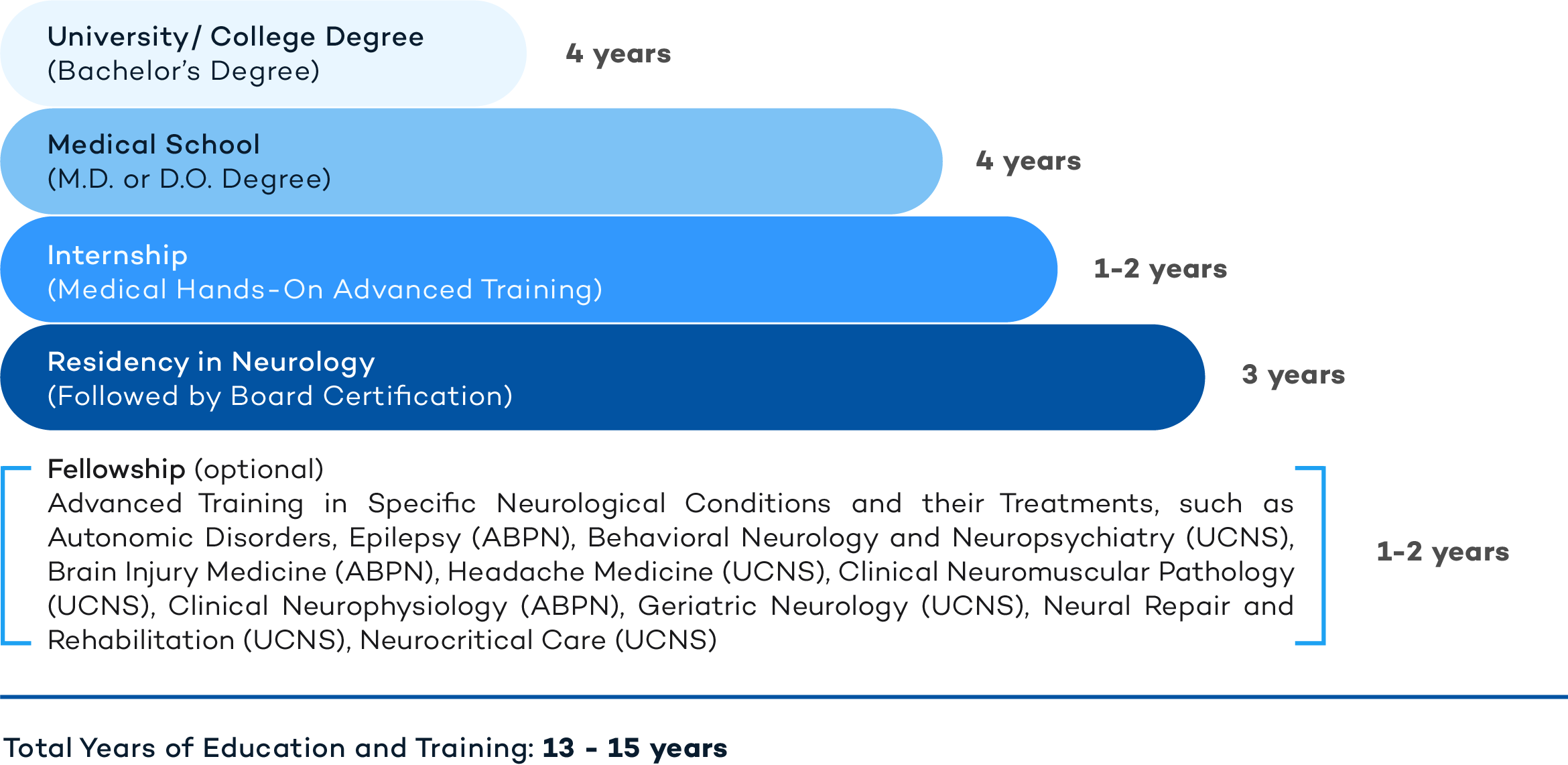

A Neurologist is a Board-Certified Doctor who specializes in treating, diagnosing, and managing disorders of the peripheral and central nervous system, including the brain. Neurologists are known for being adept diagnosticians and focus on complex conditions that they diagnose and treat through detailed review of history, physical examination, and assessment of mental status, vision, speech, strength, sensation, coordination, reflexes, gait, and other sensory and motor functions. They may supplement their evaluation with a full range of diagnostic tests, including computed tomography (CT), computer-assisted tomography (CAT) scans, and magnetic resonance imaging (MRI).
The level of expertise and the credentials needed to treat a specific neurologic condition are important factors when choosing the right physician. Finding a trusted neurologist is an important factor in order to obtain adequate care. Your primary healthcare provider (Internal Medicine, Family Medicine, Pediatrics, or OB/GYN) can facilitate a referral to a neurologist, and you can also do your due diligence by checking the credentials and practice style of the doctor. At myDoqter, you have access to patient feedback about doctors, and you can also see the professional recommendations given by other physicians who have witnessed first-hand the expertise and professional competency of your doctor.
Neurologists are doctors (M.D. or D.O.) with advanced medical degrees and training. The following is a representation of the years of education and training that a Neurologist has undergone.

NEURO from the Greek word ‘neuron’ for ‘nerve’ + LOGY from the Greek word ‘logia’ which means ‘logic’ or ‘the study of’.
A Neurologist treats an extensive list of conditions related to the brain and the nervous system, including:
Amyotrophic Lateral Sclerosis (ALS): A disease characterized by progressive weakening of muscles, which eventually may lead to death. Symptoms may include weakness in a limb, muscle twitching, and slurred speech. It is also known as Lou Gehrig’s disease.
Brain Tumors: These are growths of abnormal cells derived from the brain structures. Some may be benign, but can still grow locally and produce symptoms from compression in the skull. Others may be malignant with the potential to spread. Symptoms may include new-onset or change in the pattern of headaches, vision problems, confusion, or other sensory or motor deficits.
Alzheimer’s Disease (and other forms of dementia): The most common type of dementia in the U.S., it afflicts 5.5 million Americans and it is among the top 5 causes of death for adults age 65 and older. Alzheimer’s disease is characterized by a group of symptoms that lead to a decline in mental function and a disruption of daily life. Symptoms may include difficulty with short-term and long-term memory, problems with decision-making abilities and judgment, confusion, inability to learn new information, as well as personality and behavior changes (depression, irritability, distrust and loss of interest in previously enjoyed activities). With the loss of problem-solving skills, patients also lose their ability to manage daily tasks and to lead independent lives. Although there is no cure for Alzheimer’s disease at this time, a number of medications can slow its progression, as well as reduce the symptoms associated with this condition. Neurologists, psychiatrists and scientists are working together to find a cure for this disease and many advances have been made. Most recently, a biotechnology company has shown promising results in investigational models using CRISPR/Cas9 gene editing to treat Alzheimer's.
Parkinson’s Disease: A progressive nervous system disorder that leads to motor dysfunction and the inability to control movements. Symptoms may worsen progressively with time, but may start with tremors, rigid muscles, and slowing of movements.
Concussions: Traumatic brain injuries that can affect brain function and can elevate the risk for neurological conditions such as strokes. Presenting symptoms may include vomiting, nausea, and headaches.
Meningitis: An inflammation of the membranes surrounding the spinal cord and the brain, which can be caused by bacterial, viral, or non-infectious causes, and can be potentially life-threatening. Vaccines are available to prevent certain bacterial causes of meningitis. Suspicion for meningitis should be high when a patient has a stiff neck, sensitivity to light, and severe headaches.
Cerebral palsy: A condition that can be related to trauma during birth and can lead to impaired movement and reflexes. Symptoms and signs of this condition commonly occur during infancy and preschool years and may include stiff muscles, exaggerated reflexes, tremors, and learning difficulties.
Multiple Sclerosis: An autoimmune disease in which the immune system attacks the nervous system. The resulting nerve damage can produce a variety of neurologic symptoms that can present in a variety of ways including, but not limited to, vision problems, tremors, pain, or tingling in different parts of the body.
Strokes: Cerebrovascular events that are more common in the elderly, and occur when the blood flow to a part of the brain gets obstructed by a blood clot or by narrowing of the arteries that go to the brain.Symptoms may include motor paralysis or numbness. Typically, symptoms will affect one side of the face, arm, or leg, but may also include problems seeing in one or both eyes accompanied by headaches.
Epilepsy: A condition or disorder of the central nervous system leading to abnormal brain activity and seizures. Symptoms may include major features such as jerking motions of the arms, legs, or body or can include a staring spell, anxiety, and temporary confusion.
Brain Aneurysms: These occur when dilatations or ballooning of the arteries in the brain rupture. This can lead to massive bleeding into the brain and is a very serious medical condition that needs immediate medical attention. The most common symptom is a sudden and extremely severe headache that may be accompanied by nausea and/or seizures. Patients often declare that they are experiencing the worst headache of their lives.
Ultimately, Prevention and Prompt and Proper Diagnosis are the most important steps towards maintaining neurological and mental health. If you experience neurological symptoms, a visit to the Neurologist can help you to manage these symptoms and potentially detect and treat neurological conditions. A Neurologist will provide you with essential information regarding neurological disorders, as well as how to promote your overall health.
The World Health Organization (WHO) recommends several preventive strategies in order to prevent neurological disorders:
Finding the right physician is an important first step to be able to receive the right treatment for your medical condition. Neurologists are trained to offer a wide range of treatment options that are tailored to specific neurologic conditions. Personalized plans will help patients to successfully manage their neurological disorder.
You can read more about Neurology in the following links:
https://www.who.int/mental_health/neurology/chapter1_neuro_disorders_public_h_challenges.pdf
https://www.psychiatry.org/psychiatrists/practice/well-being-and-burnout
https://www.aan.com/policy-and-guidelines/guidelines/guidelines-open-for-public-comment/